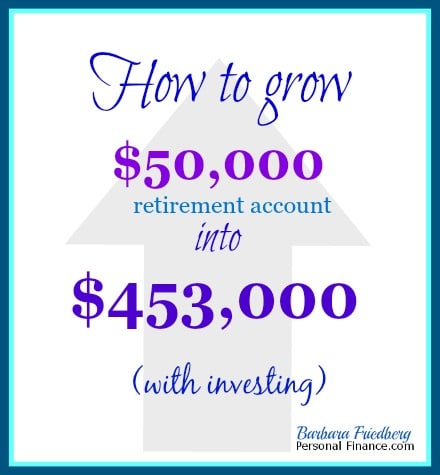Retirement Account Guidelines-Reader Question
I received this retirement account question this week:
I’d like to ask what should I consider (and what questions should I be asking others/myself) when deciding where to roll-over my 401(k)?
Quick Profile:
– 30 years old
– Recently married; husband has full-time job, (but itching to leave).
– I just left my full-time job to start my own business (so it will be a while until I can contribute to a retirement plan).
– No debts! credit cards paid in full, college loans paid off!
– 401(k) has about $50kOptions (broad strokes):
– Keep my 401k with my company at a cost of $100/yr to cover admin fees.
– Roll-over to IRA (fee of about $30/yr?)
– Roll-over to Roth IRA (people say this is the best way to go, but I will have to pay taxes on the $50k now! – does that still make sense?)As a beginner investor who has talked to other investment professionals, I don’t feel like I’ve received the proper guidance. I have felt that they don’t have the time to hear about my needs and hash out my situation. Perhaps because they haven’t won my business yet!
Would appreciate any advice or pointed questions to research.
Thank you! -R.W.
First off, congratulations for deciding to roll over your retirement account and not cash it out. I’ve seen too many people leave a job and spend their retirement account proceeds.
It’s usually a good idea to roll over your retirement account when you leave a job so that you will have more control over the money and in most cases, pay lower fees.
Retirement account reminder; The reason to keep funds in a retirement account and to continue contributing is that the money in the account (whichever type you choose) is not taxed during the time it is in the account.
Retirement Account – Leave the Money In!
Think about this. You’re 30 years old and have an account worth $50,000.
Let’s assume that you never contribute any more money into this account. Further, imagine that you invest the money as follows; 30% in a diversified bond index mutual fund ETF and 70% in an all-world mutual fund or ETF. Next, simply leave the money in the account.
And the only thing you do with the money is rebalance the account every January, back to your original 30% bond: 70% stock asset allocation .
If this retirement account earns 6.5% annually, at age 65, your original $50,000 will be worth $453,000.
This compounded retirement account growth happens without adding a dime to the original $50,000. Let this information motivate you not to withdraw your retirement account money when you leave a job.
Now, on to the answer to your original question, “What to do with your retirement account when you leave your job?”
Step by Step Retirement Roll Over Guide
Consider your options-where to put the money?
Do you have another discount brokerage account with a firm such as Charles Schwab, Fidelity, TD Ameritrade, or Vanguard? If so, and you’re happy with the service, then it’s simplest to keep your investments under one roof.
If not, my personal experience with all of those companies is positive and they all offer reasonable commissions and a wide variety of index fund investments (which I recommend for most investors). Sometimes a company will pay you a bonus to roll your account over, so I would check their respective websites’ and see if there are any offers. If not, it doesn’t hurt to ask when you speak with a company representative.
Choose a discount broker and speak with an associate about how to proceed with the rollover. They will give you information about the process. The rep will tell you if you can transfer your current investments ‘as is’ into the new account or whether you will need to sell them in the existing retirement account first.
Click here and be the first to get my upcoming book; a definitive blueprint for investing with index funds and beating active fund managers. (+ free Wealth Tips Newsletter and Investing Rules Cheat Sheet)What type of retirement account to choose? Roth or Traditional IRA?
I can understand your confusion about which type of account to choose. There are a few key differences between these two types of rollover retirement accounts.
Simple put, a traditional rollover IRA will not require you to pay any taxes on the rollover monies (as long as you roll them over directly or within 60 days of withdrawal). The money in the account will grow without any tax obligation until you take it out in retirement. At age 70 1/2 you are required to start withdrawing the money from the traditional rollover IRA. At that time you’ll owe taxes, at your ordinary income tax rate, for the amount you withdraw each year.
If you choose to roll over the account into a Roth IRA, then you’ll need to pay tax on the roll over amount. There are several advantages to paying the tax now on the Roth IRA roll over. First off, when you withdraw the funds during retirement, you will not owe any tax. Also, the Roth IRA, unlike the traditional IRA has no required minimum distribution date. Thus, if you don’t want to start withdrawing the funds at age 70 1/2, you don’t need to. And the Roth IRA can be passed on to your heirs.
If you wait until the year after you leave your job to convert the retirement account to a Roth, you may be in a lower tax bracket and thus pay lower taxes on the rollover money.
How Should the Retirement Account Money be Invested?
After the funds are transferred, you need to examine your investments and decide whether they are in line with how you want them to be invested. My favorite investing book, which is only 100 pages is called The Elements of Investing by Ellis and Malkiel. I also have an investing book launching this month called Invest and Beat the Pros; Create & Manage a Successful Investment Portfolio which will give you an easy to follow investing blueprint.
Click here and be the first to get my upcoming book; a definitive blueprint for investing with index funds and beating active fund managers. (+ free Wealth Tips Newsletter and Investing Rules Cheat Sheet)Good luck with your future investing. Keep adding a bit each month to your retirement accounts for a wealthy life, now and later.
Read more reader questions here.


